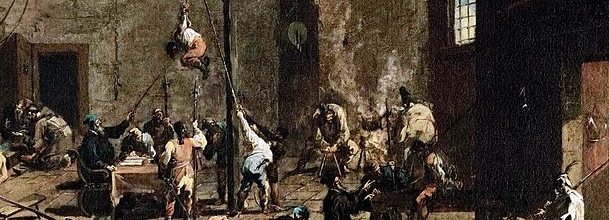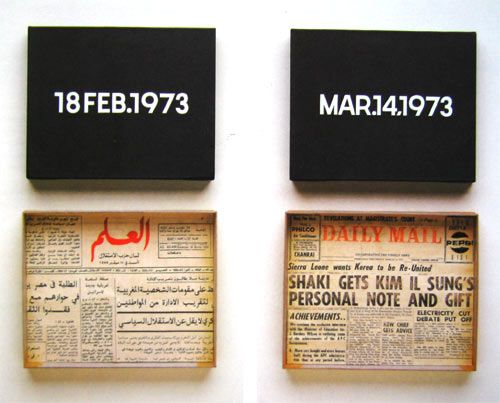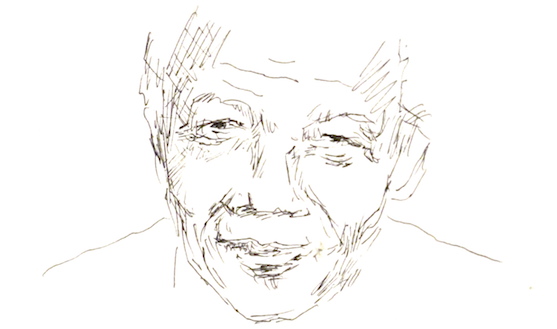 Email Gist |
Email Gist |  Print Gist
Print Gist  Alessandro Magnasco, detail of "Interrogations in Jail" (1710)
Alessandro Magnasco, detail of "Interrogations in Jail" (1710)
"Others....at least knew where they were immediately going, and had a very rough unconscious idea as to their ultimate destination on this planet. They imagined that they would one day, having worn their lives out in beetle-service, die, more or less painfully and slowly, in bed. And most of them did. But the red-haired Gorse...did not have even this trivial advantage in unconscious foreknowledge.
For he was to die painlessly and quickly. And he was not to do so in bed."
--Patrick Hamilton, Mr. Stimpson and Mr. Gorse
I'm a tired man, but even when tired, I try to maintain my manners. If I spent the night tossing and turning, throwing the sheets off, pulling them back on, flopping my head on the pillow, I will attempt to be peaceable when the coffee is served scalding, or without a cup. But there are happenings out there in the wide world that make me bend my Emily Post until the spine snaps. And one polite fiction I'd like to see observed, say, more politely, is that of the death penalty as a rock-ribbed dispenser of justice.
The authorities could have deigned to say, perhaps, "sorry" to Iwao Hakamada. Instead, Japanese prosecutors are appealing the decision to free the seventy-eight year old ex-boxer, after DNA evidence exonerated him in the 1966 quadruple murder that put him on death row. I'm willing to bet Hakamada probably doesn't care about the burdens of the docket, at this point. He already experienced the pressure and police torture which extracted a false confession from him all those years ago, in what proved to be only the beginning of his troubles.
There are only two photos I could easily find of Hakamada. One is of him as a young man -- taciturn, with a flat nose, he looks every bit the professional welterweight he was. The other is of a stooping elderly man, trudging out of prison, wearing the clothes his surviving family brought. The forty-eight years in between is some lacuna, never photographed, into which the makings of what should have been a life were dumped.
Of course, we don't have to cross an ocean to find Iwao Hakamada. We can ask Glenn Ford, who spent thirty years on death row in Louisiana for a murder he did not commit. Ford was similarly denied a fair trial: with an all-white jury, an unreliable informant, and ambulance chasers as his defense counsel, he was headed to Angola. And even in freedom, of course, it is a sad story: Isadore Rozeman's murderer goes unpunished, just as he did the thirty years Ford spent in a hole.
And what of the people whose names we don't even know? Both Hakamada and Ford had time, nothing but sullen, deadlocked time, in which to protest their innocence, and, remarkably, they were eventually heeded. But most death row inmates eventually run out of time. You can ask for the names. You will want to ask very quietly, and politely. They're written in stone, propped up in whatever pauper's field they bury them in.

 Email Gist |
Email Gist |  Print Gist
Print Gist  Rutabagas.
Rutabagas. Email Gist |
Email Gist |  Print Gist
Print Gist ABOUT THE GUEST WRITER: Crispus Mammon is a novelist, writer, and wanderer. Currently on loan from Grantland, where he is a contributing editor, Crispus has also written for Crease Magazine, The Californian, MugWump, Driftwood Quarterly, grease gun, The Atascadero State Breeze, The New Iniquity, Dimestore, and Rugburn Quarterly. He has no home. There is no God but bourbon, and bacon is his prophet. He plunged himself into the billowy wave and an echo arose from the suicide's grave, Oh willow, titwillow, titwillow.
* * *
Strange stories can find you at strange times. Like when you’re trying to write a classic piece of piquant long-form "who'd a thunk it?" journalism for men 18 to 49 years old and suddenly you realized you have murdered a human being.
It was well past noon sometime last spring and I was slumped in my chair in the Johnny Drama Conference Room, in the Grantland offices on Figueroa, across from the Staples Center. I hadn’t asked for those few extra hours of bleary consciousness, rubbing a few bumps of crushed-up Adderall on my gums and chasing it with Nyquil in the bathroom to keep the Sickness down, but I did try to do something useful with them. You’re battling insomnia and headaches and a lot of other things looking at your co-workers, all jammed in the room and seated around you. I don't remember their faces. We were all white guys. The room looked like a jar of tongue depressors.
I write journalism. Sometimes poorly, sometimes less so. Like all long-form journalists, I spend far too much time thinking of ways to turn less material into more narrative. You know the kind of story I write — "Ohio Zoo Massacre," the kind of zaniness long-formers trip over to bludgeon into a narrative some glossy will buy. That's what brings home the bacon and bourbon, not how many words you know — though I do know words, words I can use, like "mer·e·tri·cious," or "a-ga-this-m." I can write those words, on a page, on a page of words about people I write about. Like two words holding hands in a crowd of other words, and I get paid "ducats" for it (look that word up).
That was the silver lining to my sleeplessness — it gave me more time to think. I've always been pretty good at playing games, but this had to be the biggest game I played. There were so many of us white male writers, reading our books, sipping our bourbon, glazing our bacon, so many out bobbing in the backwash of our thirties, scrambling to grab enough magazine assignments with "illumination" and "depth" that we might someday cobble together a book like Gladwell, and skewer them all with the artificial spine of a catchy neologism — "Squish," or "Kvetch," or something.
And it was then, during one of those restless nights, that I first realized: no writer has ever killed their long-form subject.
A chill ran down my spine.
I could almost hear Frank Sinatra sniffle. I could almost feel the National Magazine Award in my hands.
It's all about the story, I reminded myself. In the words of my murderous ideological forefather, Esquire's Chris Jones, "Words have meaning; sentences have power; paragraphs can change a life." And what better way to change a life than to end it? Couched as it would be in the ineluctable structure and modality of piquant white-guy storytelling, the gravity of my crime would pass scarcely noticed, and yet the novelty of murdering a profile subject would still register. My editors would obviously have no problem, provided, as iterated before, that the murder was preceded by enough material such that a spurious narrative could be constructed. Who, after all, could honestly believe that just words could lead to death and damnation? Well, Bill Simmons for one, by the time I was through with him.
Not everybody knows how I killed my subject, or, indeed, who my subject really was. Wrapped as they are now in plastic sheets and honeyed words, their appearance in life is now unknowable, decayed as it has been with the pallor of my deed. You may accuse me of many things, turning such an apparently evil act into the grist of the printer. Did I fail a moral test? Did I write a true story? Did I harm or hinder a speck of life, or rather, explode it in a vale of creative destruction? Did I make man small, or rather, just make myself, the writer, big? I don't know. And apparently, the highest paid elites in my industry don't either — they're still running the piece.
Writing a eulogy for a person who I murdered is an odd experience. What makes it harder is that you're still reading it. And we're still writing it.

 Email Gist |
Email Gist |  Print Gist
Print Gist
 On Kawara, Date paintings (via visual-poetry.tumblr.com)
On Kawara, Date paintings (via visual-poetry.tumblr.com)
It is a new year, and yet, with the new year came an immemorial calm as snow drifts enveloped my estate, padding all life away for the next few months. I stoked a sickly fire in my study. The room was stuffy, the air stale, as if it had all been inhaled and exhaled by a wooly mammoth. My Russian Blue, Astrakhan, lay curled, inured to my anxieties, on the warm stones before the hearth. I clucked my tongue, but the creature did not stir, the faint outline of his little ribs silently rising and falling. Yes, I was, at last, quite alone.

 Email Gist |
Email Gist |  Print Gist
Print Gist  Illustration by Faheem Haider for American Circus.
Illustration by Faheem Haider for American Circus.
It's fitting that Nelson Mandela died in December. Judging by most of the encomiums I've heard, he was apparently a South African version of Santa Claus — grandfatherly, with a kind face that suggested a deep enjoyment of milk and cookies. Most importantly, Mandela was, at worst, gentle with the bad boys and girls. That is, after all, what most of the fulsome praise he was subject to for the past decades praised — the mercy he extended to the caucasoid slime who had ruled South Africa. In this rendering, Mandela is an eternally octogenarian saint — the details of how he came to be canonized not all that important.

 Email Gist |
Email Gist |  Print Gist
Print Gist